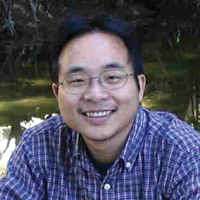Two UT faculty will receive up to $600,000 from the Department of Defense’s (DoD) Defense Established Program to Stimulate Competitive Research (DEPSCoR) award. DEPSCoR is a capacity-building program designed to strengthen the basic research infrastructure at institutions of higher education in underutilized states/territories.
The DEPSCoR Research Collaboration competition is open to tenured and tenure-track faculty members in 37 states/territories, leading to over 115 white papers to compete for DEPSCoR funds. Subject matter experts in the Military Services selected the final 25 collaborative teams, which included Eric Lass, assistant professor in the Department of Materials Science and Engineering, and Haidong Zhou, associate professor in the Department of Physics and Astronomy.
Lass hopes to uncover a relationship between fundamental physics, like thermodynamics, and the deformation behavior in R-CCAs (Refractory Compositionally Complex Alloys). He believes that this research project is a viable step in developing new materials for extreme environments. The award will pave the way for future scientific investigations of R-CCAs and other materials, and eventually lead to commercially viable new materials. If successful, material engineers will possess the ability to tailor the strength and ductility, the degree to which a material can be plastically deformed, through changes in the alloy composition or processing.
“If current shortcomings of R-CCAs can be overcome, they will enable the operation of turbine engines at much higher temperatures than currently possible. Increasing the operating temperature of a turbine engine increases fuel efficiency and energy conversion efficiency, which will substantially reduce the environmental impact of power generation and air transportation.,” said Lass. “Additionally, if R-CCAs can be made ductile, which is a considerable improvement over current materials in terms of elevated temperature capability and potential energy absorption, it offers significant advantages for the U.S. military.”
Zhou is striving to help identify the most effective symmetry configuration to achieve elasto-modulation and elasto-switching of anti-ferromagnetic (AFM) materials. In 2018, Zhou, along with Jian Liu, Associate Professor in Physics, were awarded a seed grant through the Mission Agency Research Seed program. With that support, they successfully conducted several projects related to strain studies and used the results to submit a proposal for the DEPSCoR Research Collaboration competition.
“High-speed electronics require ultra-fast manipulation of charge transport, for which conventional transistors have had great success by electrical gating control of the carrier density. This method of modulating electronic conduction in conventional semi-conductors is, however, approaching the performance limit in the GHz regime. Magnetic materials, on the other hand, are known to host spin dynamics that may afford high-frequency modulation well beyond conventional semi-conductors.” said Zhou. “These characteristics could lead to high-speed, energy-efficient, high-density, and “invisible” magnetoelectronic devices. The challenge is to find effective non-magnetic controls of the AFM order and identify microscopic mechanisms that convert modulations of the AFM structure into significant and robust electronic outputs.”
Each team will receive the reward over a three-year period of performance to pursue science and engineering research in areas relevant to DoD initiatives supporting the National Defense Strategy.
“DEPSCoR allows us to tap into institutions that have enormous basic research capabilities – but have been underutilized by the Department of Defense – to enhance U.S. science and engineering research capacity both now and in the future.” said Bindu Nair, director of DoD’s Basic Research Office.


